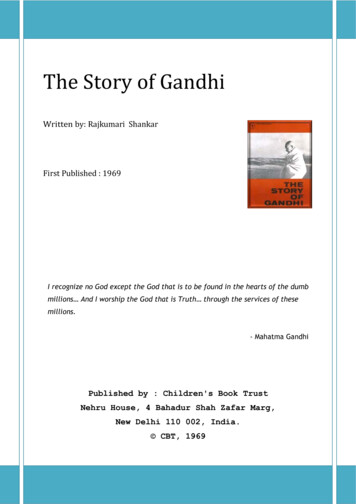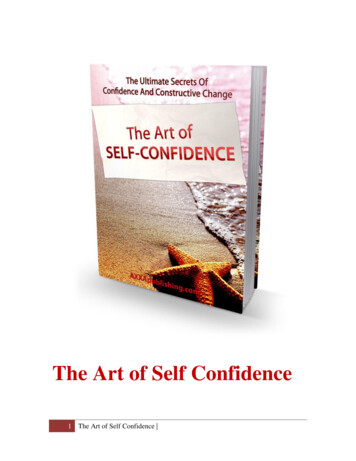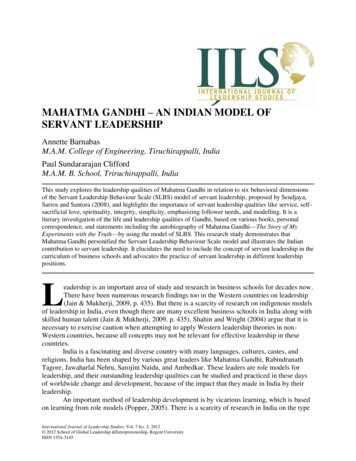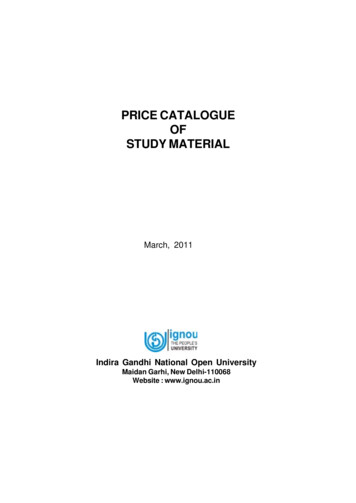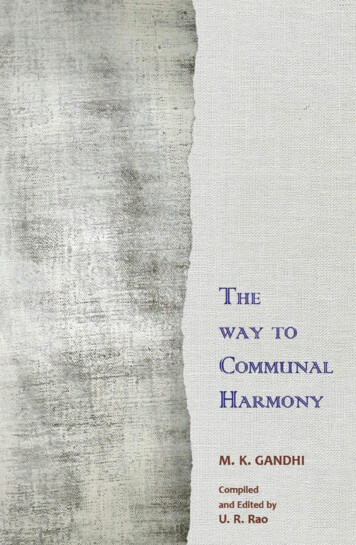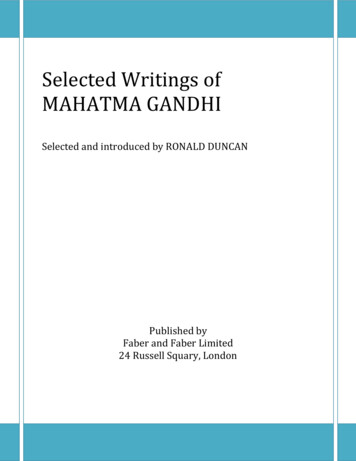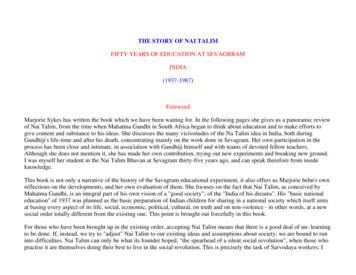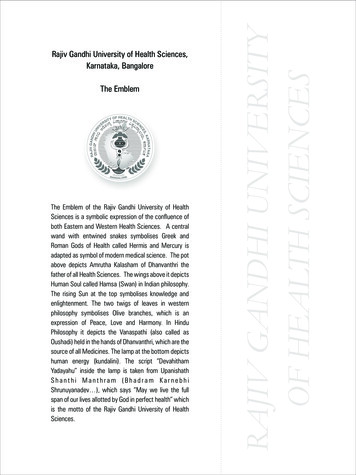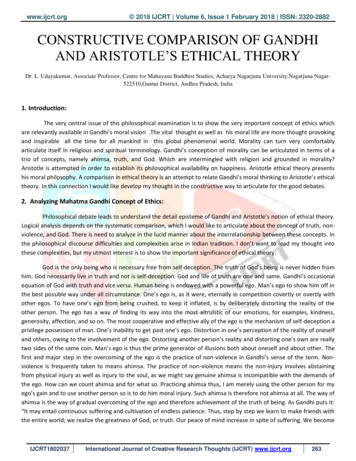
Transcription
www.ijcrt.org 2018 IJCRT Volume 6, Issue 1 February 2018 ISSN: 2320-2882CONSTRUCTIVE COMPARISON OF GANDHIAND ARISTOTLE’S ETHICAL THEORYDr. L. Udayakumar, Associate Professor, Centre for Mahayana Buddhist Studies, Acharya Nagarjuna University,Nagarjuna Nagar522510,Guntur District, Andhra Pradesh, India1. Introduction:The very central issue of this philosophical examination is to show the very important concept of ethics whichare relevantly available in Gandhi’s moral vision .The vital thought as well as his moral life are more thought provokingand inspirable all the time for all mankind in this global phenomenal world. Morality can turn very comfortablyarticulate itself in religious and spiritual terminology. Gandhi’s conception of morality can be articulated in terms of atrio of concepts, namely ahimsa, truth, and God. Which are intermingled with religion and grounded in morality?Aristotle is attempted in order to establish its philosophical availability on happiness. Aristotle ethical theory presentshis moral philosophy. A comparison in ethical theory is an attempt to relate Gandhi’s moral thinking to Aristotle’s ethicaltheory. In this connection I would like develop my thought in the constructive way to articulate for the good debates.2. Analyzing Mahatma Gandhi Concept of Ethics:Philosophical debate leads to understand the detail episteme of Gandhi and Aristotle’s notion of ethical theory.Logical analysis depends on the systematic comparison, which I would like to articulate about the concept of truth, nonviolence, and God. There is need to analyze in the lucid manner about the interrelationship between these concepts. Inthe philosophical discourse difficulties and complexities arise in Indian tradition. I don’t want to lead my thought intothese complexities, but my utmost interest is to show the important significance of ethical theory.God is the only being who is necessary free from self-deception. The truth of God’s being is never hidden fromhim. God necessarily live in truth and not is self-deception. God and life of truth are one and same. Gandhi’s occasionalequation of God with truth and vice versa. Human being is endowed with a powerful ego. Man’s ego to show him off inthe best possible way under all circumstance. One’s ego is, as it were, eternally in competition covertly or overtly withother egos. To have one’s ego from being crushed, to keep it inflated, is by deliberately distorting the reality of theother person. The ego has a way of finding its way into the most altruistic of our emotions, for examples, kindness,generosity, affection, and so on. The most cooperative and effective ally of the ego is the mechanism of self-deception aprivilege possession of man. One’s inability to get past one’s ego. Distortion in one’s perception of the reality of oneselfand others, owing to the involvement of the ego. Distorting another person’s reality and distorting one’s own are reallytwo sides of the same coin. Man’s ego is thus the prime generator of illusions both about oneself and about other. Thefirst and major step in the overcoming of the ego is the practice of non-violence in Gandhi’s sense of the term. Nonviolence is frequently taken to means ahimsa. The practice of non-violence means the non-injury involves abstainingfrom physical injury as well as injury to the soul, as we might say genuine ahimsa is incompatible with the demands ofthe ego. How can we count ahimsa and for what so. Practicing ahimsa thus, I am merely using the other person for myego’s gain and to use another person so is to do him moral injury. Such ahimsa is therefore not ahimsa at all. The way ofahimsa is the way of gradual overcoming of the ego and therefore achievement of the truth of being. As Gandhi puts it:“It may entail continuous suffering and cultivation of endless patience. Thus, step by step we learn to make friends withthe entire world; we realize the greatness of God, or truth. Our peace of mind increase in spite of suffering. We becomeIJCRT1802037International Journal of Creative Research Thoughts (IJCRT) www.ijcrt.org263
www.ijcrt.org 2018 IJCRT Volume 6, Issue 1 February 2018 ISSN: 2320-2882braver and more enterprising, we understand more clearly the difference between what is everlasting and what is not.Our pride melts away, and we become humble. Our worldly attachments diminished and so does the evil within usdiminish from day to day”.1 Ahimsa may occasionally flow into love which is the opposite of egoism. Gandhi says thatlove is the positive mode of ahimsa. To have truly loved someone is also to have conquered one’s ego in relation to himor her. At the heart of the idea of love is the idea of total selflessness. Selflessness is but another name for egolessness.All these are connection to morality. Moral life is the life free from selfishness and this is achieved by overcoming thepowerful ego centricity of human perception and action. The idea of justice is also central to morality. Justice not only inthe sense that my assessment of my fellow human beings must be capable of being justified but also, more importantlymy perception and assessment of the other must do justice to him.The idea of truth and ahimsa are central to an adequate conception of the moral life, or of the phenomenologyof morals. God is the perfect embodiment of the moral life in its total selflessness, in its complete self-luminosity, and inits loving justice. God is the beyond the life of morality for an essential aspect of the moral life is the continuous strivingtowards perfection, and God necessarily there is no such striving. This is true in a way and these examples why it isimpossible to find, in real life, a totally indubitable example of the morally perfect person. The idea of God is essentialfor morality because it ensures that the ideal of perfection which the conception of moral life involves. It finds the mostobjective embodiment in God.The moral life must be permeated by a sense of dynamic unity, it is the opposite of the fragmented and themechanical consider the idea of the virtuous life. The virtuous life is apparently one where the so-called virtues, havewon over the vices. But virtues, in isolation an unrelated in a mutually enhancing unity, do not by themselves contributeto the moral life. For example, consider the virtuous of courage, intelligence, and temperance. Both courage andintelligence can be put most effectively to immoral or evil uses courage and intelligence of a God. Love is greatestenemy, both logical and natural, of the ego and illusions generated by the ego are the most powerful hurdles in the wayof the knowledge of truth of one’s being. God embodies the unity of the moral life in his absolute perfection and thusensures the reality of this unity. The concept of moral goodness, the idea of transcendence is embodiment of it in placeand time. A human being who embodies moral perfection in its absolute totality moral perfectibility is an ideal, andforever remains and ideal for human being as Gandhi used to ”one can always be more perfect than one is”.2Theabsurdity and the self-refuting character of the statement. “I have now achieved complete moral perfection”. 33. Understanding Aristotle Concept of Ethics:The main concern of this writing to show the main aims of Aristotle ethical theory as developed in Nicomacheanethics. Aristotle did not regard ethics and politics as discrete, but rather as two aspects of a single subject of study. Themain purpose of this writing is to construct and making of caparison with Gandhi as briefly as possible the main pointsof Aristotle’s argument in Nicomachean Ethics. “Every art and very inquiry, and similarly every action and pursuit, isthought to aim at some good; and for this reason the good has rightly been declared to be that at which all things aim”.4With this above statement the investigation will start between Aristotle inquiry and art of politics and their mainconcern for the good man as a goal or an end, Aristotle pointed out that both ordinary folk as well as people ofcultivation believe that happiness is good. Pleasure, wealth, honor, and health are mentioned as well as Plato’sconception that these goods are somehow caused by the idea of the good. His argument leads happiness as completeand final goal to pursue for his on sake not for the sake of anything else. He identifies his pridominary happiness as theultimate good. “If this is the case, human good turns out to be activity of the soul in accordance with the best and mostcomplete”.4 But we must add ‘in a complete life’. For one swallow does not make a summer, nor does one day, and sotoo one day, or a short time does not make a man blessed and happy.IJCRT1802037International Journal of Creative Research Thoughts (IJCRT) www.ijcrt.org264
www.ijcrt.org 2018 IJCRT Volume 6, Issue 1 February 2018 ISSN: 2320-2882As per Aristotle understanding happiness as a feeling, the feeling was deep and permanent and purified of grossbodily pleasures neither did he see it simply as disposition of temperament? Happy was an activity through which a mandevelops his capacities by living and faring well and reaching his well-being in mind and body. Happiness emerges as anactivity, something final “for the sake of which anything else is done”, 5 self-sufficient. We consider a self-sufficient thingto mean a thing which merely standing by itself alone renders life desirable and lacking in nothing, and finally happinessmust be a lasting state which is called final goal. For support of the above concept of happiness, he cited the three-foldclassification of good, namely external good, good of soul, and good of the body. Soul is good in the highest sense.Happy man lives well and forces well. Happiness has something to do with virtue or practical wisdom or philosophicwisdom, or pleasure or prosperity; he pauses to focus on virtue. Virtue is compatible with his own account of happinessas the highest good. Happiness entails virtues activity. Aristotle introduces the important conviction, which is so centralto his ethical thinking, that activity, action or praxis is of the highest worth, as compared to the state.The life of happy man would also be pleasant, in this connection Aristotle makes an observation about thenature of pleasure. “Now for most men their pleasures are in conflict with one another because these are not by naturepleasant, but the lovers of what is noble find pleasant the things that are by nature pleasant, and virtuous actions aresuch, so that these are pleasant for such men as well as in their own nature. Their life, therefore, has no further need ofpleasure as a sort of adventitious charm, but has its pleasure in itself”.6 Pleasure is regarded as a concomitant andcompletion of an activity. Happiness then is the best, noblest, and most pleasant thing is the world. Happiness is anactivity in accordance with virtue; Aristotle turns to the nature of virtue. Aristotle makes it clear that virtue concerns thesoul. Souls are three parts: the vegetative, the appetitive, and the rational. The vegetative is clearly irrational and hencemust be regarded in any ethical enquiry. The appetitive, in a sense, is also irrational, but in another sense is rational.Hence ethics must concern itself with the appetitive and rational parts of his soul. The distinctions between the moraland intellectual virtues are related to each other as the appetitive is to the rational part of the soul. Virtue is two kinds:intellectual and moral. Intellectual is on the main indebted to teaching for its production and growth, this is calls fortime and experience. Moral goodness is the child of habit, from which it has got its very name.Politics and ethics are two concepts which are not separate in his thinking. Ethics and politics are practicalepisteme. In Aristotle sense, episteme means scientific knowledge or theory of knowledge which a demonstrativeknowledge is showing the universal and necessary connection between substance and their attributes. Aristotleepisteme are two types: Theoretical and practical. For theoretical, metaphysics, mathematic and physics. Practicalepisteme aims at human action. Practical episteme detecting what is noble and base, right and wrong, good and bad inpraxis. Aristotle approaches the morality of praxis from an existential perspective. Episteme seeks to discover reasons,causes or moral principles in order to show the link between the attributes of goodness and badness and correspondinghuman acts. In Nicomachean ethics and politics, Aristotle carefully outlined the principles of the good human life. Thegreat moral principle such as eudemonism or happiness, intellectualism, virtuous, means choice and its precedingdeliberation, moral character and moral habit.Aristotle did not separate his two practical science, ethics and politics. Ethics studies man’s individual conduct,moral character and happiness. Politics studies the social, economical and political conduct of a citizen. Both aims are atthe morally good life of a man and citizen. Both are very close to each other. Ethics and politics are partnership toestablish good human life, is the chief end of the society, both collectively for all its members and individual. ForAristotle, politics aims at the highest moral good for the civilized existence of its citizens. It must be in duty to create thebest possible opportunity for living the good life and there is no fundamental difference between ethics and politics.IJCRT1802037International Journal of Creative Research Thoughts (IJCRT) www.ijcrt.org265
www.ijcrt.org 2018 IJCRT Volume 6, Issue 1 February 2018 ISSN: 2320-28824. Constructive Comparison:The central purpose of this constructive work is to show the close similar concept of ethics of these two greathistorical personalities. I would like to discuss Gandhi’s central moral insights and then relate Gandhi to Aristotle, who isundoubtedly one of the greatest moral philosophers of all time. Both Gandhi to Aristotle are profoundly opposed to themodern liberal humanist individualist and utilitarian conception of man and life of goodness. My purpose is to show theconstructive comparison on these two great personalities’ concept of ethics. For Aristotle religion is nothing to do theconcept of life of goodness and other hand Gandhi thought of the religious and moral as logically inseparable from eachother. The comparison between the Aristotelian and Gandhian, oppositions to modernism interesting andphilosophically suggestive. Many Aristotelians insights are reflected in Gandhi’s position about the essential preconditions of the moral life. This comparison is essential to bring out the philosophical availability of Gandhi’s moralthinking.The ethical position of Aristotle and Gandhi is that both conceive of ethics in practical terms. For Aristotle theconcept of ethics as practical episteme ensure this and this is not classed with theoretical episteme but with thepractical knowledge where speculation is subordinated to the guidance of human action. Aristotle expressed veryclearly that the goal of his ethical discourse is not theoretical but very practical. There is no point in talking about thegood life in an ethical enquiry insofar as this life is not practically attainable by human beings. Goodness essentiallyrequires that we should become good men and we must apply our minds to the solution of the problems of conduct.Aristotle ethics is very practical because the human life will be possible choose. Here, possible means capabilities in astrong sense. Human being life is one that means human being can live as the best life for good living. Human life mustbe within human capabilities, it must be possible for human beings to choose it. For Gandhi, moral problem is not tounderstand the nature of goodness theoretically but to be a good person or to seek the truth existentially. Gandhi’sthinking was pervaded by the desire to actualize the good in practice, to experimentally achieve truth, and to live a goodlife.7Both Gandhi and Aristotle saw ethics and morality as a crucial domain of right choice, virtue and action- karmafor Gandhi and praxis for Aristotle were the central terms in morality. Gandhi’s practical conception of ethics need notdetract from its philosophical worth. Both have similar insights about ethical vulnerability and indeterminacy. I wouldlike to raise that what political science attempts to answer- admits of so much divergence and variation of opinion thatit is widely believed that morality is a convention and not part of the nature of things and similar fluctuation of opinionabout the character of the good. Good things have hurtful consequences. We have many examples; human beings areruined by their money or killed by their courage. Aristotle’s practical wisdom must be flexible, prepared for surprise,ready to see, and resourceful at improvisation. Aristotle is unlike Plato, who constructed an ethics with generality andcommensurability of values. Values could be subsumed under ideas, ethical particularity was not important. Aristotle’swhole conception of ethics is one with a certain amount of impression, and that this comes from a vision where humanvalues which are constitutive of the good life are plural and incommensurable. Ethical particularity has certainimportant consequences. No clear understanding of the practical sphere and organize it. There is system of practicalrules that will prepare us before the fact for the demands of any new situation. This mean the moral agent will not betaken by surprise. The above statements and ethical commensurability was not accepted by Aristotle. Anotherimportant consequence of ethical particularity is vulnerability to loss. Ethical rules can only guide us but never prepareus for the unique dynamics of each particular moral situation, therefore, with Aristotle, there is the possibility of makingmistakes in the moral life and there is a vulnerability in the moral life and there is good is fragile. As per this abovestatement Aristotle is different from Plato. Good man has the ability to understand each such situation and respond to itfrom the depth of his moral way of life with utmost sincerity. There is no universal guidelines by which he can beIJCRT1802037International Journal of Creative Research Thoughts (IJCRT) www.ijcrt.org266
www.ijcrt.org 2018 IJCRT Volume 6, Issue 1 February 2018 ISSN: 2320-2882cognitively secured and emotionally safe. This is way Aristotle insists on the experience of long years and advice of theman of practical wisdom in moral matter.Gandhi is also moral thinker and knows about ethical vulnerability which he spoke in general term about theAhimsa and Truth.8 He said by experience that in practice was always to appreciate particular moral situation, he is verykeen in particular and interested in the smallest of moral problems of the most insignificant people and give the samemoral attention as he did to the issues of nations. Gandhi did not subsume ethical situations under general rules. Hetried to meet the new situations from within a moral way of life with sincerity and with the awareness of moralvulnerability. There was no commensurability of all value terms in one safe principle for commensurability of all valueterms in one safe principle of Gandhi. Gandhi is again often missed by the Gandhian who feels that following ahimsa isan overriding and universal principle which removes ethical vulnerability in one large sweep. Gandhi himself saw theethical particularity and its consequences in terms of indeterminacy and the vulnerability of the moral life. Gandhi oftenrecommended ahimsa with the argument that, if one made mistakes in its path, it hurt no one other than the adherent.His usage of the term “experiments” is again very suggestion in his discussion of truth. Gandhi saw the dynamism of themoral law of life. He made moral journeys with the goal of getting closer and closer to the truth of his own being. Ethicalparticularity and vulnerability was therefore another point of similarity between Aristotle’s ethical theory and Gandhi.9The very concept of Aristotle on means and ends in ethics. This concept is very different with Gandhi. Hecompletely rejects such a distinction in ethics. When we appreciate the fact that both Aristotle and Gandhi opposed theliberal humanist individualistic and utilitarian conceptions of human goodness which is at the heart of modernism. It willbecome apparent that in their ethics the distinction between means and end cannot really be prominent. As perutilitarian position that means are morally irrelevant if the goal secured is pleasure. Aristotle’s happiness is an activity ofsoul in accordance with virtue. Therefore virtue is the means to happiness .10 Teleology is there in the sense ofpurposiveness and this is the distinction between means and ends in Aristotle. This position is not so different from thatof Gandhi. Gandhi’s ethical thinking also has a telos in terms of the pursuance of truth, and rejection of means and endsis the rejection of the instrumentality and moral irrelevance of means.11 A life devoid of virtue cannot be justified forGandhi in term of the moral uprightness of an end achieved. In Aristotle life devoid of virtue cannot lead to the telos atall. Both have the same position regarding the life of goodness and profoundly opposed to the modernist one.Aristotle’s aim in science, metaphysic and ethics is to save the appearances and their truth. For Aristotle, thegood life is reflected in the right choices and good action. For Gandhi, it is completely so. Of course Aristotle is anintellectual and so the best life for him is one of contemplation. Whereas Gandhi is a man of action and therefore forhim the best life is one of action. There is no much difference in terms of ethical theory because the life ofcontemplation in Aristotle is for very few. For both, virtue and goodness is activity. Aristotle and Gandhi speak of moraltraining and discipline albeit in different ways. Aristotle speaks of virtue as being inculcated by habit and Gandhi stressesthat one should keep trying on the path of virtue and each step brings one nearer the good life. Why should I be moral?Gandhi and Aristotle response, Aristotle reply, happiness is an activity of the soul in accordance with the practice of thevirtues. Virtues and happiness are thus internally connected, in the absence of an adequate infrastructure for whatAristotle would regard as a potentially fulfilling human life; the connection may not begin to surface. The internalconnection between virtue and happiness may become invisible. Regarding this Gandhi quoted. “It may entailcontinuous suffering and the cultivation of endless patience. Thus, step by step, we learn to make friends with theentire world; we realize the greatness of God or truth. Our peace of mind increase in spite of suffering, we becomebraver and more enterprising. Our pride melts away, and we become humble. Our worldly attachments diminish and sodoes the evil within us diminish from day to day.”12 The virtue man is happy because he delights in virtues. Gandhihimself was exemplary in the sense of joy which pervaded his life.IJCRT1802037International Journal of Creative Research Thoughts (IJCRT) www.ijcrt.org267
www.ijcrt.org 2018 IJCRT Volume 6, Issue 1 February 2018 ISSN: 2320-2882There are differences between Gandhi and Aristotle regarding happiness and moral life. On the basic of faith onreligious stand point of Gandhi that the good man will not want for anything. Gandhi’s belief also includes the factorthat when a person is truly virtues and uses his resources for the benefit of society. Society wills always contributegenerously to his cause- a life of settlers service is self sustaining. Purity of motive evokes faith in others. For Aristotleperception, Gandhi believed in the internal connection, yet he also sought to restructure society and reform politics. Hisconceptions of Swaraj and Ram rajya reflect the same Aristotelian concern for a state which provides the conditions forleading a good and virtuous life. Ram rajya refers to a state which internalizes into its laws and institutions for leading agood moral life. The important comparison on politics and ethics by Gandhi and Aristotle. Politics makes for the goodlife of its citizens by providing moral motivation in the form of connection between happiness and virtue. Aristotle takesabout politics and ethics and distinguishes in two senses of politics:1. Politics is the art of governing and administering the polis-legal, administrative and military endeavors, as alsoorganization of the democratic process.2. This seems to be the sense in Nicomachean ethics when Aristotle speaks of politics and ethics is that politics isthe practical science that sets laws, norms, and rules of human conduct.13Aristotle ethical theory refers as moral politics. Moral politics guides humans to happiness, to the good humanlife, and therefore it is political ethics. Aristotle distinguishes politics as setting the conditions of the good form of lifefrom politics as the business of government. For Gandhi is distinction between power politics and what he refers to astrue politics. Politics pervades all our activities into practice. I know that in this country all constructive activities are partof politics. In my view it is true. Non-violence can have nothing to do with politics of power. There is different betweenGandhi and Aristotle view on politics.1. Aristotle was intellectual and made the conceptual difference from that perspective alone. Gandhi experienced thedifference and was alive to the moral vulnerability of the life of governance.2. Gandhi was living in a troubled political line and actively involved in the political arena. He tried with true politics twosenses of politics is conceptual difference. Politics is ethic at work in that it provides conditions of civilized and goodliving for a mass of people and proper structure of society. Laws and norms are framed with justice as the purpose thenthere is life-like connection between happiness and good life, and which can provide an answer to the problem of moralmotivation. Gandhi and Aristotle are very concern of the mass of the people who were this susceptible to moral despair.For people or mass people the moral form of life and life of viciousness of politics becomes essential to theestablishment of the good life.The second sense of politics, the conceptual distinction between the business of government, democraticprocess, administration and true or keenly alive to the possibility of corruption and the danger to the moral life or life ofvirtue. The role of the statement in preventing such degeneration becomes very crucial. This factor is appreciated byboth Aristotle and Gandhi. Gandhi speaks of compulsory and voluntary poverty for the statement to maintain the purityof public life. Again Aristotle speaks about the statesman as ethically mature and an example in terms of moral virtues.The conceptual difference are theory good philosophy and enough if ethical theory can do just this much.5. Conclusion:As per my argument and presentation what I want to express very instructive and strongly supportive of theidea that Gandhi is relevant to the primary concerns of moral philosophy. There is profound similarity of vision andcommitment. Aristotle’s conception of the life of goodness while for Gandhi the religious and moral were inseparableIJCRT1802037International Journal of Creative Research Thoughts (IJCRT) www.ijcrt.org268
www.ijcrt.org 2018 IJCRT Volume 6, Issue 1 February 2018 ISSN: 2320-2882from each other and Gandhi’s conception of the religious rested on a moral core. A constructive comparison betweenthe Aristotelian and Gandhian opposition to modernism interesting and philosophically suggestion. This comparisonbrings out the viability of the philosophical availability of Gandhi’s moral thinking.Notes and Reference:1.2.3.4.5.6.7.8.9.10.11.12.13.M. K. Gandhi, From Veranda Mandir: Ashram Observances, translated by V. G. Desai,The Navajivan Trust, Ahmedabad, 1932,Aristotle, Politics, Book I, in The Complete Works of Aristotle, edited by J. Barnes, Middlesex, 1953.M. K. Gandhi, quoted in The Moral and Political Writings of Mahatma Gandhi Vol.II, edited by Raghavan Iyer, Clarendon Press,Oxford, 1986.Aristotle, Nicomachean Ethics, translated by J.A.K Thomson. Penguin Books, Middlesex, 1953.ibid.ibid.F. M. Eterovich, Aristotle’s Nicomachean Ethics: Commentary and Analysis, University Press of America, Washington D.C.,1980.ibid.M. K. Gandhi, speech at Gandhi Sewa Sangh, 21 February, 1940, quoted in The Moral and Political Writings of MahatmaGandhi Vol. I, edited by Raghavan Iyer, Clarendon Press, Oxford, 1986.MacIntyre, Alasdair, After Virtue: A study in moral theory, London, Duckworth, 1985.M. K. Gandhi, An Autobiography or The Story of my experiments with truth, Navajivan Publishing House, Ahmedabad, 1927.M. K. Gandhi, From Veranda Mandir: Ashram Observances, translated by V. G. Desai,The Navajivan Trust, Ahmedabad, 1932ibid.IJCRT1802037International Journal of Creative Research Thoughts (IJCRT) www.ijcrt.org269
enemy, both logical and natural, of the ego and illusions generated by the ego are the most powerful hurdles in the way of the knowledge of truth of ones being. God embodies the unity of the moral life in his absolute perfection and thus ensures the reality of this unity. The concept of moral goodness, the idea of transcendence is embodiment of .
